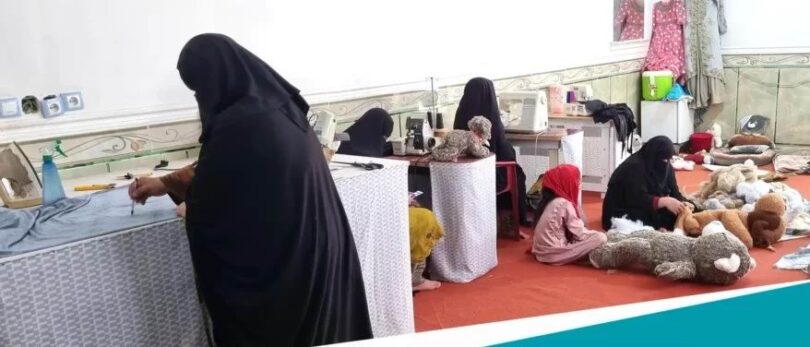ZARANJ (Pajhwok): A woman in northwestern Nimroz province has established a doll making factory by initially investing just 2,000 afghanis. She says she will hire more women if supported. In last two years, the number of female investors has increased in production and commercial sectors, but this is the first time that a woman with such a small amount of capital has been able to establish a workshop. Malalai Zuri, a resident of Zaranj city and founder of the dolls making workshop, told Pajhwok Afghan News: “One year ago, we started the doll-making business at home with a capital of 2,000 afghanis in cooperation with a group of six people, and until now we have been selling our products online.” She added now after one year she managed to establish “Jawaher Sistan Doll Manufacturing Workshop” with a capital of 100,000 afghanis. She learned designing clothes in Iran, where she worked for five years in a factory and would design clothes and after returning to the country, she bought and sold clothes from home for 12 years in Nimroz. She added: “The purpose of creating this workshop is to show everyone that women are creative and have the ability to do anything. My aim is to provide work to unemployed and poor women. My last goal is to prevent importation of dolls and replace them with locally produced dolls”. According to Zuri, six people work in the newly established workshop, including a marketer and the rest are designers and tailors, all females. She says: “On average, 40 to 50 dolls are produced in this workshop every day and depending on orders from stores, sometimes we make up to 100 dolls in two days.” She cited insufficient capital to buy standard machines, lack of space and high cost of electricity as major challenges to their work. “Our electricity bills amount to 10,000 afghanis and we have to increase in the product’s price.” While calling her income unstable, she added: “More customers means more income. Thanks God, our business has prospered. We have good sales through marketing.” Zuri said besides making dolls, they also sew children’s clothes, headboards, etc, according to customers’ orders. She hoped she would be able to promote her business and hire more women and raise the level of production if supported. She added: “My big goal is to prevent the entry of dolls from abroad, to make available local products to children and all the capital that goes to China and Iran is used to buy dolls in our country.” Mula Qanbari, in charge of marketing and purchasing raw materials for this workshop, says: Zuri has been able to provide work to several women, including myself, by creating this workshop, and doll-making is also a new initiative.” Maulvi Talha, owner of “Golshan chain store”, who is one of the clients of this workshop, told Pajhwok that the quality of the workshop’s products was improving and could compete with foreign products and in the future, it could supply better products to the market. Najibullah Khashrodi, Nimroz Chamber of Commerce and Investment president, said in the past two years, women had created small and large businesses with their own initiative and creativity, including doll manufacturing. He added: “Making dolls is an irreplaceable entrepreneurship in Afghanistan and fortunately, the women of Nimrozi are trying in many ways to be useful in the growth of the country’s economy.”







